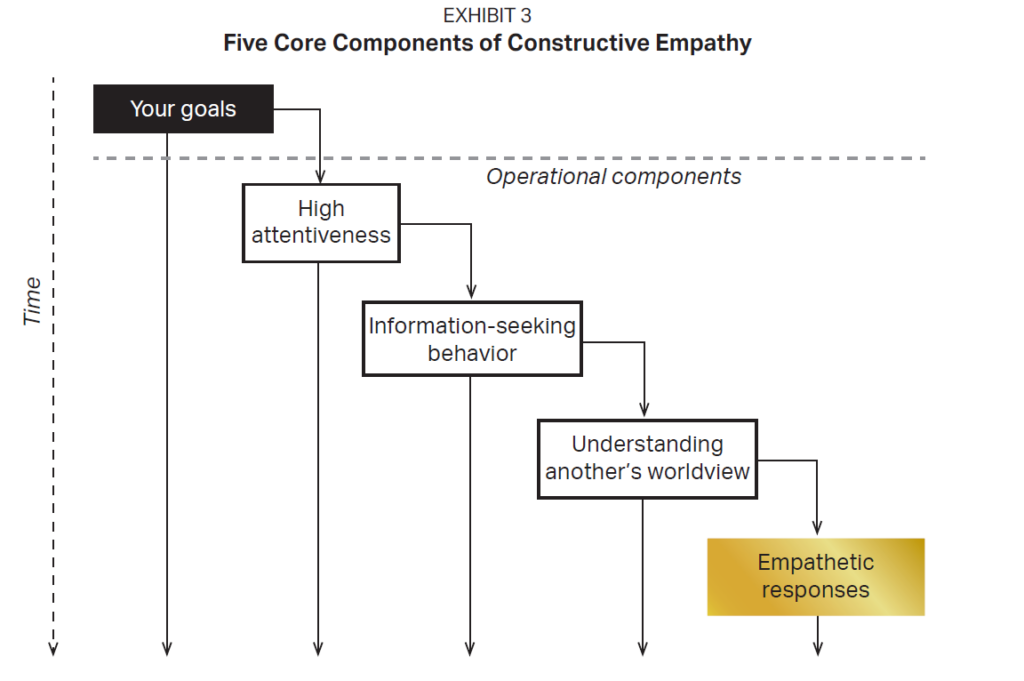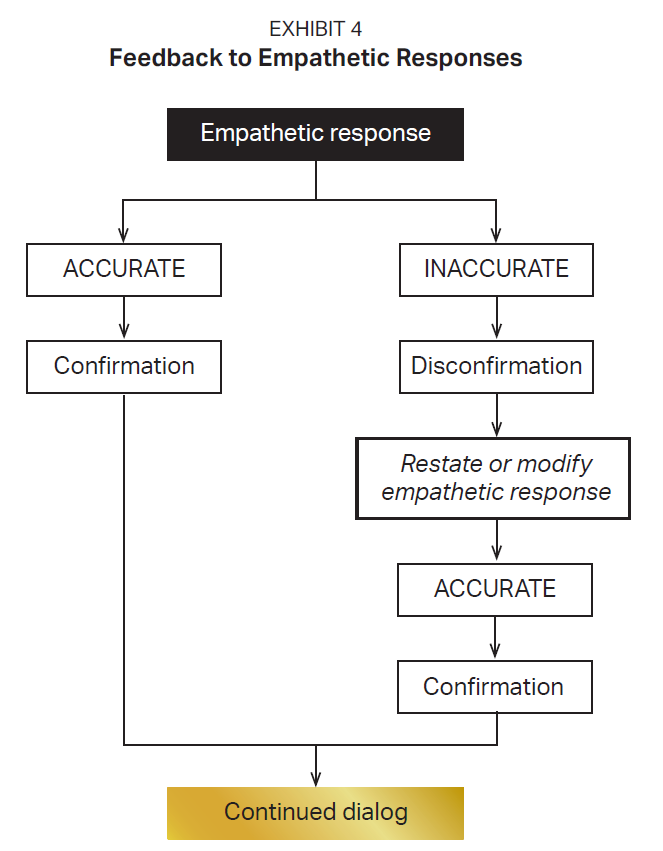Key Takeaways:
- Constructive empathy involves “stepping into the shoes” of another person, for the purpose of creating an agreement or deal.
- It’s crucial that you be highly attentive to the other person’s comments during a negotiation and engage in active listening.
- You don’t have to agree with people’s views to be empathetic toward them in important situations.
Whether it’s for professional or personal reasons, you probably want to get your way more often in life. A highly effective way to do that, of course, is to strengthen your skills as a negotiator.
But it might surprise you to learn that one of the best ways to build that negotiation muscle is to stop “playing hardball” in dealing with others and start using the power of empathy.
That’s a key lesson we have learned from the self-made Super Rich—people with a net worth of $500 million or more who earned their wealth. From our experience working with this highly successful group, we see that they tend to be much better than others at building rapport and deep connections when dealing with people. Their “secret weapon” in that process is empathy.
The end result: They do an exceptional job at not just achieving their goals but also helping others get what they want—which, in turn, motivates those people to help the Super Rich become even wealthier and more successful in the future.
Here’s how the Super Rich make empathy a key tool in their business dealings.
Outcome-focused empathy
Let’s start with a definition. Empathy is the ability to understand another person’s views, feelings and experiences from that person’s point of view, rather than from your own. As such, empathy goes beyond simply comprehending someone’s situation. When you have empathy, you can essentially “step into the shoes” of another person—seeing and feeling the world (or some part of it) as they do.
In many ways, empathy is a basic human characteristic and the core of emotional intelligence. It’s even become a key aspect of learning in schools across the country.
In business situations or other instances where deals need to be struck, we find that the Super Rich are usually adept at using what we call constructive empathy—empathy that has a tangible purpose behind it. It allows you not only to think and feel from another person’s vantage point—including being able to access what is driving them—but also to communicate to that person that you understand them on a deep level.
The goal is to build rapport with that person so you can increase the chances of achieving an ideal outcome in a business environment.
Empathy and negotiating
Indeed, constructive empathy is part of the foundation for rapport and, subsequently, all manner of effective, mutually beneficial business dealings.
Specifically, constructive empathy is a cornerstone of most productive negotiations. By leveraging empathy, you can increase your ability to achieve your agenda as well as help others achieve their goals—a true win-win where everyone gets what they need and also feels heard and understood.
Such moments can set the stage for future ventures, deals and agreements that can further boost wealth and success.
That’s certainly what we see when we look at the negotiating habits of highly successful entrepreneurs, who make it a point to focus closely on the emotional aspects and drivers of the other parties involved. This stands in stark contrast to entrepreneurs and others who believe the most effective negotiating tool is an approach that focuses only on the numbers, what is rational and having strong arguments.
For many Super Rich business owners, for example, constructive empathy in our experience is key to building and growing powerful relationships that translate into exceedingly smart, valuable business arrangements. Business owners who employ empathy in their dealings with others—rather than using a confrontational, zero-sum approach—tend to find themselves engaged in partnerships where everyone’s problems are addressed. The result: Everyone walks away content and ready to move forward.
This empathy-based approach is effective mainly because it enables you to get a good idea of the issues that the other person regards as extremely important. Armed with that information, you can potentially propose a deal that’s better, a deal that gets everyone to the finish line quicker or both. In stark contrast, a hard-edged approach where you try to win at all costs or “break” the counterparty too often results in suboptimal deals—or a failure to make any deal at all.
Important: Constructive empathy does not mean you are required to agree with the other person’s views and feelings. You can strongly disagree with someone’s outlook or perspective yet be empathetic. The key is that you understand those issues through the person’s lens—where their outlook came from and the impact it has on the person’s beliefs, values and actions—and that you make it clear to the other person that you possess such clear understanding.
The five core components of constructive empathy
There are multiple strategies for building and using constructive empathy, but they’re all built on five core components (see Exhibit 3). The process usually starts with identifying your own goals, well before you are in contact with other people. Then it gets operational, beginning with you being highly attentive to the person across the table from you. Based on the information you gather, you are able to get a better and better understanding of the other person’s worldview. Armed with deep understanding, you can empathetically respond.

Bring these five pieces to bear on your next negotiation and you may reach a great deal.
1. Your goals
These are the goals and objectives you are seeking to achieve in your life and/or business. For example, if you are aiming to become seriously wealthy (to have, say, a net worth of $20 million or more), regularly keep this number front and center as part of your path to constructive empathy. Don’t let empathy for the other people in a negotiation cause you to forget why you’re at the table. As you learn about other people, you are always looking for how their aims and objectives compare to your own—thus enabling you to find ways to further everyone’s aims.
2. High attentiveness
When people feel they are being listened to very deeply and attentively, they usually become less guarded and defensive. With their defenses lowered, they tend to be more reflective and more open to sharing important details. But being highly attentive can be challenging— especially if you are so preoccupied with your own positions and points of view that you don’t really hear the other person talking.
The way to be highly attentive is by actively listening. Active listening involves focusing intensely on what other people are saying and being nonjudgmental about their points of view and their interpretations of situations and facts. If you let defensiveness replace curiosity, you’ll fail to build rapport. Make sure to uncross your arms and use a measured tone of voice, too—both of which will show your receptiveness to what is being said. You want other people to be comfortable enough around you that they become very willing to share what is most important to them.
3. Information-seeking behavior
Help people open up and share with you their stories, their beliefs and their values. Employ nonverbal prompts such as silence (which allows the other person the space to keep talking) and physical attentiveness (such as head nods and eye contact), as well as verbal prompts (“I see,” “Go on” and “And then…” are reliable go-to prompts that keep people talking). Of course, you’ll also ask them direct questions to elicit key information and get them to reflect on what they’re talking about so you can get a deeper read on how they think and make decisions.
Warning: Be careful not to come across as manipulative here. You’ve got to be sincere as you converse with the other person and show genuine interest in what they tell you. Otherwise, they’ll see through your veneer quickly.
4. Understanding another’s worldview
As you build up considerable amounts of information, you can start to put together the puzzle pieces that will give you a clear picture of that person’s worldview. Look to identify key messages and feelings by asking yourself:
- What is the theme of their story?
- What are the main beliefs they hold dear?
- What is most important to this person, and why?
- What do I think keeps them up at night with worry?
- What am I missing?
5. Empathetic responses
Empathetic responses are your interpretation of someone else’s worldview. They require you to echo that worldview and the drivers behind it back to the person so they see that you really do understand—or at least that you are sincerely trying to understand.
One basic but typically effective approach is the formula of filling in the blanks to this phrase:
So you feel ______________ because __________________.
You can also use the technique of summarizing. With this strategy, you take a portion of the other person’s worldview, identify the foundational elements, and provide the person with a brief consolidated summary.
Your summary or echoing might be right on target—or you may be off the mark. After you make your attempt at an empathetic response, look for feedback that will help you gauge the accuracy of your interpretation (see Exhibit 4).

Making connections
Ultimately, the rapport you build with others through an empathetic approach to deal-making is probably going to help you achieve success better than will a winner-take-all attitude. So forget what you’ve seen or read about always being tough as nails in negotiations. Instead, seek to build connections with the people across the table. That’s what the Super Rich do—and they’re more successful because of it!
Get in Touch!
Set up an appointment at your convenience:
Schedule Phone Meeting
Schedule Video Conference
Schedule In-Person Meeting
ACKNOWLEDGMENT: This article was published by the VFO Inner Circle, a global financial concierge group working with affluent individuals and families and is distributed with its permission. Copyright 2024 by AES Nation, LLC.
This report is intended to be used for educational purposes only and does not constitute a solicitation to purchase any security or advisory services. Past performance is no guarantee of future results. An investment in any security involves significant risks and any investment may lose value. Refer to all risk disclosures related to each security product carefully before investing. Securities offered through Fischer Financial Services. Vern Fischer is a registered representative of Fischer Financial Services. Vern Fischer and Fischer Financial Services are not affiliated with AES Nation, LLC. AES Nation, LLC is the creator and publisher of the VFO Inner Circle Flash Report.






